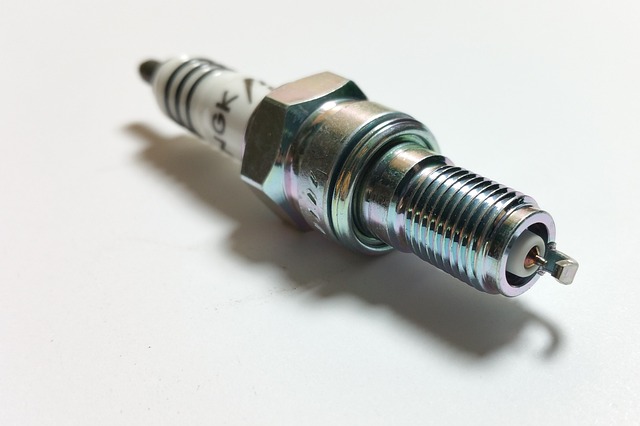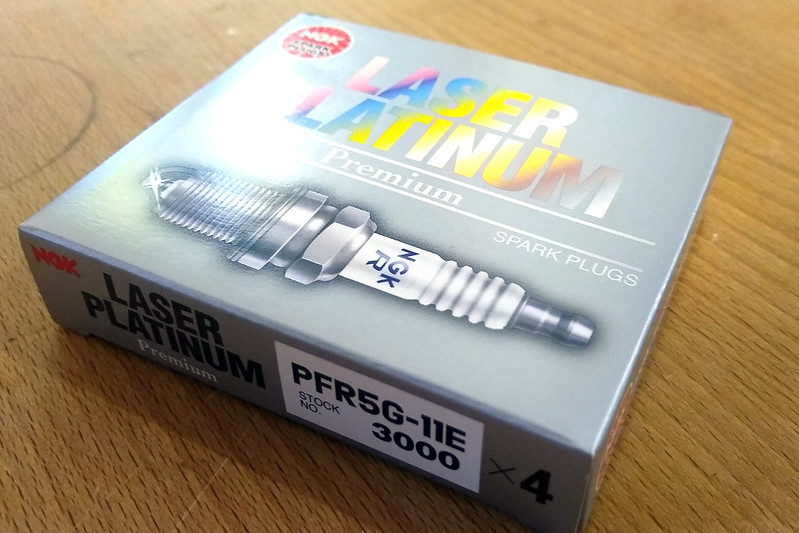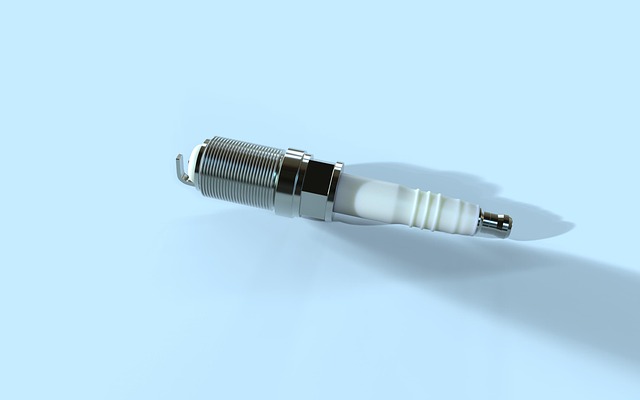Iridium spark plugs provide better performance and longevity, while platinum spark plugs are more affordable but not as durable. If you’re looking for a long-lasting option that can withstand extreme conditions, iridium spark plugs may be the best choice for you. However, if you want an affordable option that still provides reliable performance, platinum spark plugs could be a suitable alternative.
What are iridium spark plugs?
(Image by Ronald Plett from Pixabay )

Iridium spark plugs are a type of high-performance spark plug that has gained popularity in recent years due to their superior performance and longevity. These spark plugs consist of an iridium alloy center electrode, which is much thinner than the traditional nickel or copper electrodes found in standard spark plugs.
The thin diameter of the iridium electrode allows for better ignitability, improved combustion efficiency, and increased fuel economy. Iridium also has a higher melting point than other metals used in spark plugs, making them extremely durable and long-lasting.
Another advantage of using iridium spark plugs is that they require less voltage to create the same amount of current as traditional copper spark plugs. This means that they put less strain on your vehicle’s electrical system, leading to improved overall performance and reduced wear over time.
Iridium spark plugs are often recommended for vehicles with high-performance engines or those subjected to extreme driving conditions such as towing heavy loads or racing. However, it’s important to note that not all vehicles may benefit from iridium sparks; always consult your owner’s manual before replacing your engine components.
What are Platinum spark plugs?

Platinum spark plugs are a type of spark plug designed to provide a long lifespan and consistent performance. The center electrode is made of platinum, which is more durable than the copper used in traditional spark plugs. Platinum plugs also have a smaller gap between the electrodes, which allows for a stronger and more efficient spark.
One of the main advantages of platinum plugs is their longevity. They can last up to 100,000 miles before needing replacement, compared to around 30,000-50,000 miles for traditional copper plugs. This makes them an excellent choice for drivers who want to reduce maintenance costs and hassle.
Platinum plugs also offer improved fuel efficiency and lower emissions due to their precise firing ability. They can help your engine run smoother and more efficiently by reducing misfires and improving ignition consistency.
However, platinum plugs are generally more expensive than copper or iridium plugs. Additionally, they may not be suitable for high-performance engines that require hotter sparks or wider gaps between electrodes.
If you’re looking for a reliable and long-lasting option with improved fuel efficiency benefits over traditional copper sparkplugs but don’t want to pay as much as iridium options would cost , then Platinum Spark Plugs are definitely worth considering!
Iridium spark plugs Vs. Platinum spark plugs – Key differences
The key difference between these two types of spark plugs is the material used for their electrodes.
Iridium spark plugs have a small electrode made of iridium metal, which is six times harder and eight times stronger than platinum. This means that iridium spark plugs last longer and require less maintenance.
On the other hand, Platinum spark plugs have an electrode made of platinum metal. While not as hard as iridium, it still offers good durability over time. However, they tend to be more expensive than standard copper core or nickel alloy core plugs.
Another significant difference between Iridium and Platinum spark plugs is their heat range rating. A plug’s heat range indicates its ability to dissipate heat from the combustion chamber quickly. In general, Iridium Spark Plugs have a higher heat range rating compared to Platinum ones due to iridum’s superior melting point quality.
Both types of spark plugs deliver reliable performance in modern vehicles but choosing one typically depends on your driving style and manufacturer recommendations for your vehicle’s ignition system requirements
How to choose the right spark plug for your vehicle
Choosing the right spark plug for your vehicle is crucial as it directly impacts its performance. The first step in choosing the right spark plug is to check your owner’s manual for the recommended type and size. This will ensure that you are using a compatible spark plug with your engine.
The next thing to consider when choosing a spark plug is the material it’s made of. If you want longer-lasting plugs, then iridium or platinum would be ideal options as they have higher durability than copper plugs.
Another factor to consider is the heat range of a spark plug. The heat range determines how quickly a spark plug transfers heat from its firing tip into the cooling system of an engine. It’s essential to choose a spark plug with proper heat range since too hot can cause pre-ignition, while too cold can cause fouling.
It’s also essential to take into account any modifications you’ve made on your car, such as turbocharging or supercharging. High-performance engines require specific types of high-performance plugs designed specifically for those applications.
Always buy quality brands from reputable manufacturers who thoroughly test their products before selling them on the market. Don’t skimp on cost when buying ignition components because cheap knockoffs might damage other parts in your vehicle and eventually lead to costly repairs down the road.
Advantages and disadvantages of iridium spark plugs?
Iridium spark plugs have several advantages over other types of spark plugs, such as copper or platinum, including:
Advantages:
- Durability: Iridium is one of the hardest metals used in spark plug construction, making it more resistant to wear and tear than other materials. This makes iridium spark plugs last longer and require less frequent replacement.
- Improved performance: Iridium spark plugs can improve engine performance by providing a stronger and more consistent spark, leading to better combustion and increased power.
- Fuel efficiency: Iridium spark plugs require less voltage to generate a spark, which can lead to improved fuel efficiency and lower emissions.
- Better cold starting: Iridium spark plugs have a smaller center electrode, which can improve cold starting performance.
However, there are also some potential disadvantages to using iridium spark plugs, including:
Disadvantages:
- Higher cost: Iridium spark plugs are generally more expensive than other types of spark plugs, which can be a drawback for budget-conscious consumers.
- Misapplication: Iridium spark plugs may not be suitable for all types of engines, and using them in an engine that is not designed for them could lead to performance issues or damage to the engine.
- Sensitivity: Iridium spark plugs are more sensitive to changes in engine conditions, such as heat range or gap setting, which may require more precise tuning for optimal performance.
Advantages and disadvantages of Platinum plugs?
Advantages:
- Durability: Platinum is a very hard metal and is more resistant to wear and tear than copper, making it more durable than copper spark plugs.
- Longevity: Platinum spark plugs have a longer lifespan than copper spark plugs, which means they need to be replaced less frequently.
- Improved performance: Platinum spark plugs provide a more consistent spark and can help improve engine performance and fuel efficiency.
- Lower emissions: Platinum spark plugs can help reduce emissions by improving combustion efficiency.
Disadvantages:
- Higher cost: Platinum spark plugs are generally more expensive than copper spark plugs, which can be a drawback for budget-conscious consumers.
- Reduced conductivity: Platinum is not as conductive as copper, which can lead to reduced spark energy and potential misfires in certain high-performance applications.
- Overheating: Platinum spark plugs can overheat and cause pre-ignition or detonation in some high-performance engines. This is because platinum has a higher melting point than copper or iridium, which can cause it to retain more heat.
- Not suitable for high-performance engines: Platinum spark plugs are not recommended for high-performance engines that operate at high temperatures or high RPMs, as they may not be able to dissipate heat quickly enough to prevent overheating.
Which is best spark plug?
When it comes to choosing the best spark plug for your vehicle, there isn’t a one-size-fits-all answer. The type of spark plug that is best for your car depends on several factors such as the make and model of your vehicle, driving style, and personal preferences.
Iridium spark plugs are known to be highly durable and long-lasting, making them an excellent choice for high-performance engines. On the other hand, platinum plugs tend to offer better fuel efficiency and smoother engine operation.
Copper plugs are another option but they do require more frequent replacements compared to iridium or platinum ones. Double-platinum or double-iridium options can also provide improved performance in certain types of vehicles.
Ultimately, consulting with a professional mechanic or referring to your owner’s manual will give you insight into which type of spark plug is recommended for your specific make/model/year. Choosing the right spark plug can optimize engine performance while ensuring optimal longevity at the same time.
Featured Image By – Thor Deichmann from Pixabay








